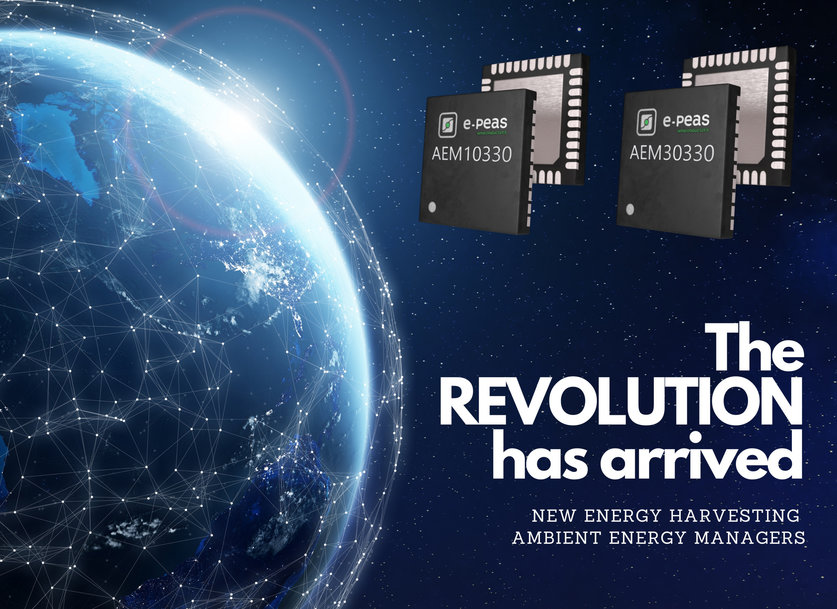electronics-journal.com
18
'21
Written on Modified on
E-PEAS Introduces Versatile New Buck-Boost ICs for Highly Efficient Energy Harvesting from Solar & RF/Vibrational Sources
Expanding its portfolio of advanced power management ICs (PMICs) for energy harvesting applications, e-peas announces the availability of two new devices adding complementary features to previously released products.

The AEM10330 and AEM30330 PMICs distinguish themselves from the competition via their innovative buck-boost architecture. They are able to deal with far lower battery voltages than other solutions on the market. Also, the high-speed charging of super-capacitors that these ICs can supervise allows more energy to be made available to the load - resulting in greater flexibility when it comes to selecting the storage device. The AEM10330 is specifically intended for solar deployments, while the AEM30330 is targeted at RF/vibration-oriented deployments (including industrial, home automation, asset tracking and aftermarket automotive monitoring systems, as well as retail applications).
One of the stand-out characteristics of both the AEM10330 and AEM30330 is the cold-start threshold at which they can begin to draw energy from the surrounding environment. This has been lowered to just 275mV/3µW, which presents a substantial improvement on the previous generation of e-peas PMICs - and is unmatched by any other solution currently available.
The new e-peas PMICs can deliver up to 60mA, so storage elements can be charged rapidly. By leveraging the fully configurable maximum power point tracking (MPPT) function, the AEM10330 and AEM30330 can continuously monitor and regulate the input with a fast refresh rate of 20ms supported. Consequently, the extraction efficiency of the system will be kept as high as possible, regardless of variations in the input from the source.
Adaptive energy management permits these devices to automatically switch between boost, buck-boost and buck operational configurations as deemed appropriate. This ensures that optimal energy transfer is always maintained between the respective inputs and outputs. Furthermore, this single power converter can automatically select between three inputs (the harvester, the storage device or a primary battery) and two outputs (the storage device or the application load). The capability of directly transferring harvested energy to the load or to the storage element is one unique feature of these PMICs.
These PMICs have a working temperature range that spans from -40°C to 125°C. They are supplied in compact 40-pin QFN packages and require only four components to accompany them. This translates into a solution with an ultra-low bill-of-materials which takes up very little board space.
“Since the release of the initial AEM series PMICs, e-peas has been differentiating itself from the other players in the energy harvesting sector through products with superior performance levels, alongside exceptional application knowledge,” says Christian Ferrier, Chief Marketing Officer at e-peas. “With these latest additions to the series, we are significantly increasing the pervasiveness of our technology, allowing a broader variety of use cases to benefit from it.”
www.e-peas.com

